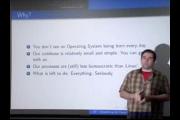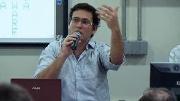Pesquisa realizada pelo termo "CCSL"

Aspectos jurídicos do software livre
Parte 2 - Palestra com Prof. Dr. Augusto Tavares Rosa Marcacini abordando temas como: "Direitos autorais: noções gerais", "Direitos autorais sobre software segundo a Lei nº 9.610", "Licenças livres perante o direito brasileiro", "Considerações sobre a GPL" e "Exclusão de responsabilidade".
Duração: 00:31:22

Aspectos jurídicos do software livre - Parte 1
Parte 1 - Palestra com Prof. Dr. Augusto Tavares Rosa Marcacini abordando temas como: "Direitos autorais: noções gerais", "Direitos autorais sobre software segundo a Lei nº 9.610", "Licenças livres perante o direito brasileiro", "Considerações sobre a GPL" e "Exclusão de responsabilidade".
Duração: 01:31:57

CCSL - 02/10/2013 - OSv - O Sistema Operacional para Cloud Computing
O OSv é o primeiro Sistema Operacional do mercado projetado
especificamente para Computação em Nuvem (Cloud Computing). A
flexibilidade trazida pela computação em nuvem é certamente sem
precedentes. Em questão de minutos um usuário tem uma nova máquina
virtual já ativa, executando o seu workload. Por máxima flexibilidade,
essa maquina virtual usualmente executa um só aplicativo, permitindo
que instancias de cada um dos aplicativos sejam provisionadas
independentemente. O isolamento entre essas máquinas virtuais é uma
tarefa relegada para o Hypervisor.
Engenheiro e Mestre pela Unicamp, Glauber tem uma
década de experiência como desenvolvedor do Kernel Linux, já tendo
sido apontado pela Linux Foundation com um dos 30 desenvolvedores mais
ativos do projeto no mundo (2009). Empregado por empresas como IBM,
Red Hat e Parallels, Glauber atuou grande parte da sua carreira , na
área de virtualização, tendo contribuições importantes para os
projetos Xen, KVM Hypervisor, QEMU, e mais recentemente Linux
Containers. Atualmente é Lead Developer do OSv, o primeiro Sistema
Operacional projetado para Computação em Nuvem.
Duração: 01:21:43

CCSL(26/09/2014) - Software Engineering, Why and What
Biografia:
David Parnas is a Canadian early pioneer of software engineering, who developed the concept of information hiding in modular programming, which is an important element of object-oriented programming today.
Dr David Lorge Parnas has been studying industrial software development since 1969. Many of his papers have been found to have lasting value. For example, a paper written 25 years ago, based on a study of avionics software, was recently awarded a SIGSOFT IMPACT award. Parnas has won more than 20 awards for his contributions. In 2007, Parnas was proud to share the IEEE Computer Societyʼs one-time sixtieth anniversary award with computer pioneer Professor Maurice Wilkes of Cambridge University. Parnas received his B.S., M.S. and Ph.D. in Electrical Engineering from Carnegie Mellon University. and honorary doctorates from the ETH in Zurich (Switzerland), the Catholic University of Louvain (Belgium), the University of Italian Switzerland (Lugano), and the Technische Universität Wien (Austria). He is licensed as a Professional Engineer in Ontario. Parnas is a Fellow of the Royal Society of Canada (RSC), the Association for Computing Machinery (ACM), the Canadian Academy of Engineering (CAE), the Gesellschaft für Informatik (GI) in Germany and the IEEE. He is a Member of the Royal Irish Academy. Parnas is the author of more than 275 papers and reports. Many have been repeatedly republished and are considered classics. A collection of his papers can be found in: Hoffman, D.M., Weiss, D.M. (eds.), “Software Fundamentals: Collected Papers by David L. Parnas”, Addison-Wesley, 2001, 664 pgs., ISBN 0-201-70369-6. Dr. Parnas is Professor Emeritus at McMaster University in Hamilton Canada, and at the University of Limerick Ireland and also an Honorary Professor at Ji Lin University in China. He is President of Middle Road Software in Ottawa, Ontario.
Duração: 01:43:40

Correntes de Conhecimento Livre
O Centro de Competência em Software Livre da USP, com sedes no IME e
no ICMC, promove o uso e o aprimoramento do software livre por meio do
ensino, pesquisa, extensão e empreendedorismo em torno do software
livre, tecnologias abertas e ciência aberta.
(CC BY-SA 2.5 BR)
Duração: 00:01:32

Evento de relançamento da Rede Social do Projeto Stoa
Evento de relançamento da Rede Social de Colaboração da USP, parte do Projeto Stoa, que aconteceu dia 05/12/2012 no auditório “Prof. Oswaldo Fadigas Fontes Torres”, STI-USP.
Duração: 00:05:20

Inauguração do prédio do CCSL-IME/USP
Festa de inauguração do novo prédio do Centro de Competência em Software Livre do IME-USP no dia 6 de agosto de 2013 com demonstrações de software livre, espetáculo de mágica e show da banda Free Software and the Open Sources. Creative Commons BY-SA.
Duração: 00:04:14

IPR, Law and FLOSS: building a protected commons
Parte 3 de 4: "IPR, Law and FLOSS: building a protected commons" com o palestrante Rishab Aiyer Ghosh (United Nations University/Maastricht Economic Research Institute on Innovation and Technology (UNU-MERIT)). This lecture provided an overview of copyright and, to a lesser extent, patents as they apply to software, and how open source depends on and uses some aspects of the IPR system for its existence, but may be threatened by others. It examined the incentives to release software as open source under different legal instruments, and compared the impact of legal frameworks for open source on innovation to tradicional frameworks such as patenting.
Duração: 00:26:54

IPR, Law and FLOSS: building a protected commons
Parte 4 de 4: "IPR, Law and FLOSS: building a protected commons" com o palestrante Rishab Aiyer Ghosh (United Nations University/Maastricht Economic Research Institute on Innovation and Technology (UNU-MERIT)). This lecture provided an overview of copyright and, to a lesser extent, patents as they apply to software, and how open source depends on and uses some aspects of the IPR system for its existence, but may be threatened by others. It examined the incentives to release software as open source under different legal instruments, and compared the impact of legal frameworks for open source on innovation to tradicional frameworks such as patenting.
Duração: 00:31:05

IPR, Law and FLOSS: building a protected commons
Parte 1 de 4: "IPR, Law and FLOSS: building a protected commons" com o palestrante Rishab Aiyer Ghosh (United Nations University/Maastricht Economic Research Institute on Innovation and Technology (UNU-MERIT)). This lecture provided an overview of copyright and, to a lesser extent, patents as they apply to software, and how open source depends on and uses some aspects of the IPR system for its existence, but may be threatened by others. It examined the incentives to release software as open source under different legal instruments, and compared the impact of legal frameworks for open source on innovation to tradicional frameworks such as patenting.
Duração: 00:32:09
 Carregando
Carregando





